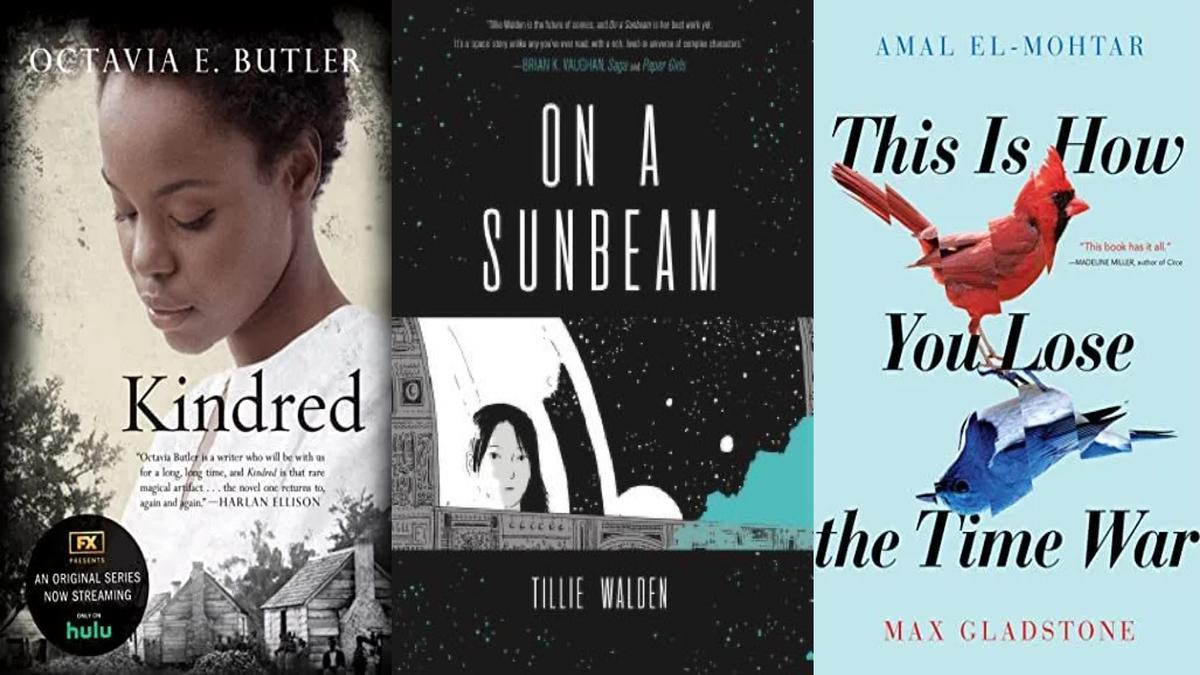
Time dilation? Quantum physics? FTL travel? I shouldn’t need a degree at MIT to understand what’s going in a book! I want to unwind when reading a novel, not feel like I’m back in school! The only chemistry I’m interested is what happens when two people fall for each other than harder meteors from heaven. I don’t want to live in a rational universe, I want to experience an emotional one. I want 10 sci-fi books for people who hate sci-fi (and science in general) – and these authors have provided.
The Long Way To A Small, Angry Planet
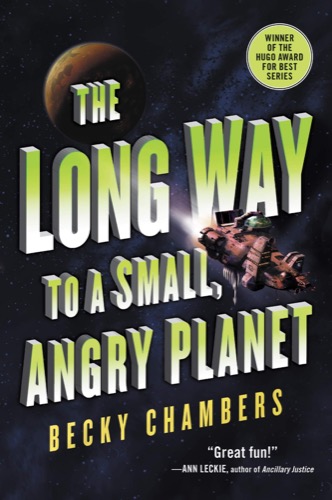
Becky Chambers’ The Long Way To A Small, Angry Planet is about a spaceship that tunnels wormholes through the galaxy to facilitate faster than light travel for blah blah blah science science science. No, what this book is REALLY about is the people onboard that ship, not the mission itself. What brought this group of misfits from separate backgrounds together to breathe the same recycled air? And what happens when people start falling in love with each other while cohabitating in a space the size of a submarine? The particulars of wormhole building don’t matter. What matters is the way these characters worm into each other’s hearts, becoming a beautiful and somewhat incestuous found family – like any self respecting spaceship crew should be. Buzz Aldrin and Neil Armstrong must have kissed at least once, right?
The Seep
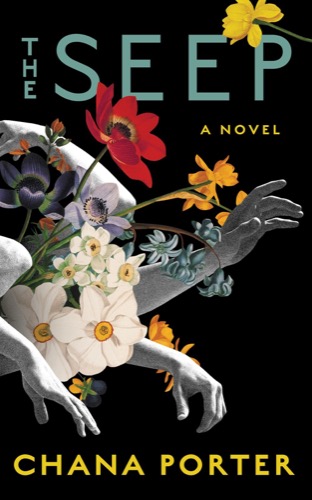
The Seep by Chana Porter is the story of an alien invasion, but don’t worry, it isn’t some long and drawn out science battle like The Three Body Problem. The Earth has been taken over by a hyper-advanced alien intelligence calling itself The Seep – which has released humanity from the shackles of war, capitalism, disease, basically everything else that makes our lives suck. Humans are now free to use Seep technology to pursue idle pleasures – like re-experiencing life as a baby, for instance! That’s exactly what Trina Goldberg-Oneka’s wife Deeba did – turned herself into a baby using Seep-tech, leaving Trina crushed. The Seep is a meditation on the false promises of utopia. In a world where you can have everything you ever wanted, you can still get your heart shattered into a million pieces – and not even a benevolent cosmic horror abomination can stitch it back together again.
On A Sunbeam
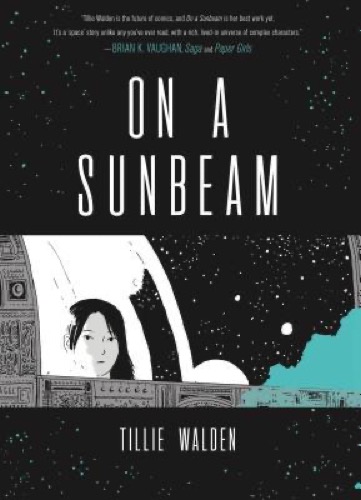
On A Sunbeam by Tillie Walden is zero science and all sapphic vibes. The plot is similar to The Long Way To A Small, Angry Planet – a spaceship crew travels throughout the stars on a science mission and slowly gets to know one another. While diving into the hearts off her fellow crew-members, the new recruit Mia dives into her own past to recall her boarding school romance with a fellow student. As past and present bleed together like two MMA fighters in the tenth round, Mia’s real mission becomes apparent. She’s joined this crew not for scientific advancement, but for romantic attachment – she’s traveling throughout the stars in a mission to track down her lost love. It’s a sci-fi story with rare steak levels of tenderness, all about a woman who would cross lightyears to be within inches of the one she lost.
Gideon The Ninth

Tamsyn Muir’s Gideon The Ninth sounds like Dune on paper: nine planet ruling Houses compete for a space emperor’s favor in a faraway star system. But when you consider that some of these Houses are ruled by gothic necromancer lesbians, the differences begin to show. Gideon Nav is a swordfighter indentured to the shadowy Ninth House and its gloomy heir Harrowhark – a woman she loathes more than slugs do salt. When Harrowhark asks Gideon to be her bodyguard in a series of necromantic trials in exchange for her freedom, Gideon jumps at the chance. In this case, “trials” are solving a murder mystery in a decaying mansion while you and eight other necromancer pairs attempt to ascend to undead godhood. Gideon The Ninth is about as scientifically plausible as the dead coming back to life – and equally as spooky.
This Is How You Lose The Time War

This Is How You Lose The Time War by Amal El-Mohtar and Max Gladstone is a romantic sci-fi romp about two agent on rival sides of a temporal war. As agents Red and Blue dive back into the past to thwart each other’s attempts to ensure future victory, they begin to leave each other little notes. The notes start as taunts, turn to conversations, and then blossom into spectacular (and treasonous) declarations of love. Time travel is already a thorny scientific subject, one that by definition screws up the laws of physics as we know them. But just like real laws, physical laws are made to be broken. In the process, hearts will get broken too. This book is an emotional doozy, and a time-tested testament to the all-conquering power of love.
The Book of The New Sun
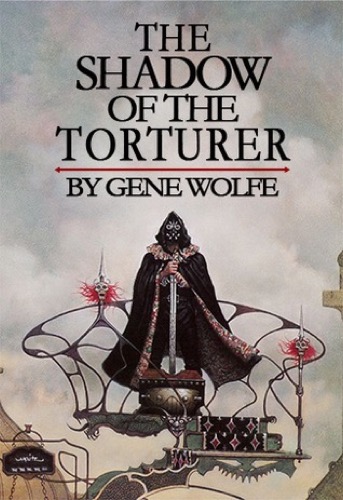
Gene Wolf’s The Book of The New Sun series is so un-sci-fi that it spends half the time pretending to be fantasy in disguise! The story begins in a grimdark fantasy world unlike our own, one wandered by a former torturer named Severian after he was exiled for showing mercy to a captive. As the story goes on, we learn that this world is actually exactly like our own – countless millennia in the future. Humankind got too big for its technological britches, and ended up orchestrating its own destruction due to runaway science. See, I told you science isn’t good for anything! The survivors of humankind built a new world atop the technological wreckage of the old, and regard all those dusty science doohickeys as incomprehensible magical artifacts. Ancient AIs masquerading as otherworldly beings, advanced extraterrestrials mistaken for gods – The Book of The New Sun gives sci-fi a high fantasy makeover. Take off your nerd glasses and let your hair down, sci-fi, just like 2000’s rom-coms taught us.
The Hitchhiker’s Guide To The Galaxy
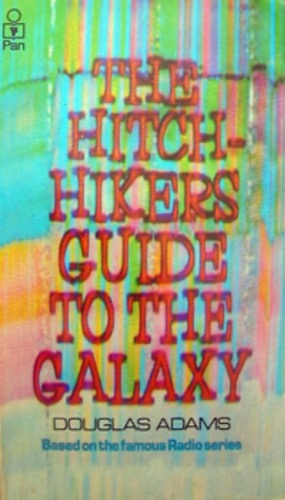
Sci-fi is a ponderous genre, pioneered by eggheads attempting to understand the nature of the universe. What the authors of yesteryear didn’t realize was that the universe could have a sense of humor. Douglas Adams’ A Hitchhiker’s Guide to The Galaxy trades the head-scratching foundations of the genre for tongue-in-cheek fun, giving readers a glimpse into a universe that is fundamentally ridiculous, yet no less full of meaning. After the Earth is destroyed to make space for an alien superhighway, one of humanity’s last surviving members – a hapless Englishman named Arthur Dent – begins a thumb-out journey through the stars. While bumming around the cosmos, he meets mentally deranged androids, boring alien bureaucrats, and a supercomputer that declares the meaning of life to be “42”. The sci-fi genre offers many things, but a good laugh is rarely one of them – Hitchhiker’s Guide changes the game.
All Tomorrows
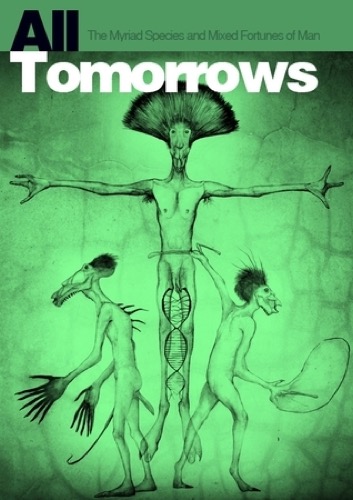
While C. M. Kösemen’s All Tomorrows does feature some more hardcore scientific and biological concepts, you’ll be too busy looking at the pretty pictures to care! And by “pretty pictures” I mean the horrifying illustrations detailing the dark paths of post-human evolution. After the human race is conquered by the gene-splicing Qu, these extraterrestrial dickheads decide to genetically engineer us back down to the bottom of the food chain. Devolved, mutated, and scattered across the cosmos, the remnants of humanity are reduced to animals – forced to evolve our way back to consciousness over millions of years. A billion year chronicle of the human race (and its myriad offshoots) All Tomorrows is a humanist horror tale about the many ways were are doomed to die. The book’s central thesis? Love who you’ve got, because nothing and nobody lasts forever.
Light From Uncommon Stars
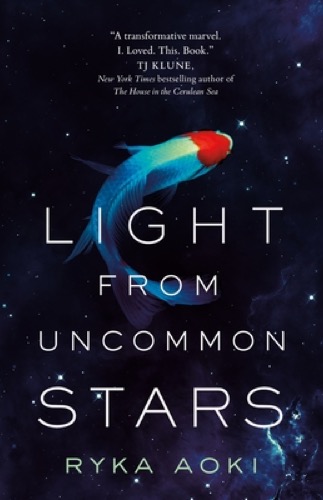
Ryka Aoki’s Light From Uncommon Stars is partially sci-fi, but delves into fantasy to compensate for the vibe. In California’s San Gabriel Valley lives Shizuka Satomi, a famous violinist stuck in a raw deal with the devil. She has to deliver the souls of seven violin prodigies to Hell, or face damnation herself. Six souls down, Shizuka thinks she’s found lucky number seven when a trans runaway violinist crosses her path. While Shizuka is attempting to convince the girl to part with her soul, she’s also falling in love with a runaway starship captain hiding out in a donut shop. It’s a delightfully weird novel about a trio of woman flung together by the whims of fate, in service of a grand design as beautiful as the heavens from which one of them has fallen.
Kindred

Octavia Butler’s Kindred is one of the most terrifying time travel novels ever written. Unlike an H.G. Wells protagonist, Dana Franklin hasn’t found herself trapped in an unknowable future, but a painful to remember past. A modern Black woman transported back to antebellum Maryland, Dana quickly runs afoul of an abusive plantation owner and his family. As Dana is thrown between the past and the present, she realizes that the plantation’s sordid history is intrinsically tied to her own. A work of sci-fi horror with as much punch as Harlan Ellison’s I Have No Mouth And I Must Scream, Kindred will induce similar shrieks.
Have a tip we should know? [email protected]







